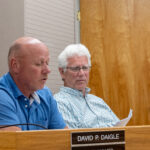By Gloria Austin
Staff Writer
Though the zoning ordinance for medical marijuana dispensaries and cultivation facilities didn’t draw any public comment or debate at Monday night’s Houlton Town Council meeting, the projected revenue sharing loss from the state did.
Councilors in attendance unanimously voted to put an ordinance in place to regulate rules, location and security of a medical marijuana dispensary if one was set up within town limits.
The town will also hold a public hearing on March 28 at 6:30 p.m. to approve a $200,000 loan for equipment acquisition and capital improvements. Among the bigger items listed are $47,800 toward a new gymnasium floor at the Gentle Memorial Building; $35,556 for a new ambulance for the Houlton Ambulance Service; and $20,000 to update radio equipment on Garrison Hill for police, ambulance and fire departments. Other items also included on the list include computer updates for Houlton Police Department, a mower for Houlton Parks and Recreation and carpeting in municipal buildings.
Drawing concern from Town Manager Doug Hazlett was revenue sharing changes proposed by the state legislature to help balance the state budget.
In 2008, Houlton saw a reduction in revenue of around $438,000.
“That is more than we spent in an entire year on snowplowing and road maintenance in the summer,” explained Hazlett. “It’s almost twice what we spend each year on repaving roads. So, it is a big number.”
Currently, different scenarios are being presented in Augusta on what may be heading the town’s way in the form of revenue sharing loss.
Hazlett said there’s a plan being presented to help balance the state budget.
“They want to put in a program that is appropriation-based,” he said. “That means each year, the legislature and governor would decide how much revenue sharing should be given to the community. That makes it rather unpredictable for us.”
The proposal on the table now is a reduction of a little over $42 million in statewide revenue sharing payout in 2012 and another $50 million in 2013.
“That would mean there is almost $100 million less being made available to communities to help hold down property taxes,” Hazlett explained. “I want everyone to be aware of this. It does not mean we are signaling there is going to be a tax increase. To the contrary, it is going to make us work even harder to find ways to grow our revenue and find ways to control our expense to try to absorb it.”
Hazlett said if the plan moves forward, towns like Houlton will have to tighten up even more.
“We are going to need to either raise revenue from other sources and/or cut the budget dramatically and that would be painful to do because we have been reducing expenditures the last few years,” he said.
Though not great news on the horizon, Houlton’s property tax base will not be affected through the end of June.
“We are still on last year’s appropriation,” Hazlett said. “It could have some impact on the second half of this year; more than likely, it would have the biggest impact next year. So it is about next year’s budget. Long term, I feel we can continue to work on reducing our dependency on revenue sharing. However, if the state cuts too much too soon, our ability to absorb those cuts without a negative impact on the mil rate will be almost impossible.”
Presque Isle, ME
54
Fog
Houlton, ME
52
Clear
Caribou, ME
54
Mist
Fort Kent, ME
56
Clear
Change Location
- Presque Isle
- Houlton
- Caribou
- Fort Kent
© 2024 Bangor Publishing Company.







